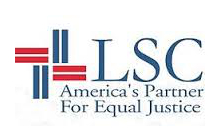New Nationwide LSC Eviction Study Examines Variations in Local Laws and Highlights Available Legal Resources
 The Legal Services Corporation (LSC) has released a research brief, the first step in a new, yearlong study on the eviction crisis in the United States. Congress directed LSC to conduct the study in the FY 2020 appropriations legislation to address concerns about the high rate of evictions in the country and the patchwork nature of local laws and regulations governing the eviction process.
The Legal Services Corporation (LSC) has released a research brief, the first step in a new, yearlong study on the eviction crisis in the United States. Congress directed LSC to conduct the study in the FY 2020 appropriations legislation to address concerns about the high rate of evictions in the country and the patchwork nature of local laws and regulations governing the eviction process.
“We are excited to be working on a study addressing the effects of state and local laws on evictions,” said LSC President Ronald S. Flagg. “Despite the enormity of the eviction crisis, there exist very few data analyzing any correlation between the substance of state and local laws and procedures and the widely disparate eviction rates across the country.”
This study comes as the U.S. faces a severe housing crisis. Even with eviction moratoria in place, an estimated 30-40 million adults and children are at risk of eviction. At the beginning of November 2020, approximately 48.7% of renters reported that they were either “likely” or “somewhat likely” to have to leave their homes due to eviction.
This initial brief provides an overview of the legal eviction process through the prism of a single jurisdiction: Shelby County, Tennessee. Shelby County was selected because it is typical of many U.S. counties: its population is concentrated in a major urban center and housing costs and unemployment rates are both average.
LSC’s examination of Shelby County shows how actions taken or not taken by tenants and landlords during the eviction process impact final outcomes. For example, it details the challenge for tenants in housing court understanding what legal defenses they may raise against their eviction. In a review of Shelby County court data from 2016-2019, LSC found that only 1.3% of cases resulted in a clear ruling for the tenant. By contrast, landlords prevailed in their eviction cases 80% of the time.
Throughout the year, LSC will publish additional briefs and reports on eviction and highlight existing research and resources. LSC has convened an advisory board of legal practitioners, academics and policymakers to help inform the study.
In partnership with Temple University’s Center for Public Health Law Research, LSC will build a comprehensive database of state and local eviction laws and processes. This database will provide policymakers, advocates, researchers, the media and the public with an initial framework for understanding eviction legal requirements and how they vary by location. LSC will examine how this variability in eviction laws and regulations affects access to justice.
LSC will also study how different legal frameworks affect the quantity and nature of evictions at the local level by analyzing millions of court records. A close look at these records will shed light on the challenges litigants face when navigating the complex civil legal system. LSC will also catalogue the range of eviction legal services, innovations and interventions available to low-income individuals.
Although this eviction study was conceived prior to the pandemic, COVID-19 has only worsened the housing crisis in the U.S. while casting a spotlight on the wide variations in eviction laws. LSC will examine the effect that the pandemic and eviction moratoria have had at the state and local level in an upcoming brief.
Read the initial brief for more information on the eviction process and details about LSC’s yearlong study.